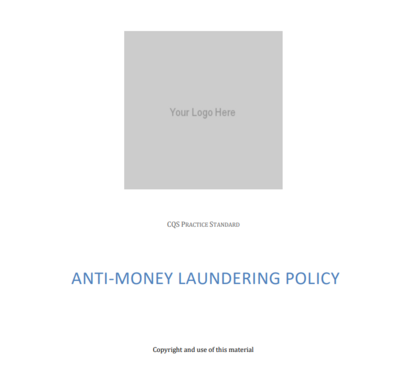CQS (CPMS) Anti-Money Laundering Policy
The recent update to the CQS Core Practice Management Standards (CPMS) requires CQS firms to have a policy in place in relation to anti-money laundering (s5.12).
CQS Policy documents can be time-consuming and difficult to prepare without a Policy Template as a starting point.
The Anti-Money Laundering Policy Template includes reference to:
- Money Laundering Regulations
- Client Due Diligence (CDD)
- Enhanced due diligence: High risk matters and clients
- Reporting suspicious transactions
...as well as other formalities and general obligations as required under 5.12 of the CPMS.
CONTENTS 1. Overview 2. Money Laundering Regulations 2017 3. Training 4. Roles 5. Client Due Diligence (CDD) 6. Client identification 6.1 Identification and verification 6.2 Documents 6.3 Clients who are not physically present 6.4 Reliance on others 6.5 Evidence required 6.6 Lack of Evidence of ID 7. Beneficial owners 7.1 Duty to identify beneficial ownership 7.2 Checking beneficial owners 8. Risk assessment 8.1 What is risk assessment? 8.2 Enhanced due diligence: High risk matters and clients 8.3 Politically Exposed Persons (PEPs) 8.4 Simplified due diligence - low risk clients and matters 9. Ongoing monitoring 9.1 What is ongoing monitoring? 9.2 Sources of funds (e.g., property purchases etc.) 9.3 Sources of Wealth (SoW) 9.4 2023 LSAG Guidance + Checklists 10. Reporting suspicious transactions 10.1 Why report? 10.2 Privilege 10.3 Asking the client to clarify 10.4 Tipping off / prejudicing an investigation 10.5 How to report 10.6 Authorised and protected disclosures 10.7 Responding to AML enquiries from the authorities 10.8 5MLD Requirements - Reporting on a Company's Beneficial Ownership 11. Detecting money laundering 11.1 Suspicion 11.2 Grounds for suspicion: General 11.3 Grounds for suspicion: Property 11.4 Chinese underground banking and funds from China 11.5 High-risk Third Countries 11.6 Submitting Better Quality Suspicious Activity Reports (SARs) 11.7 Registered Charities 12. Cryptocurrencies and Other New Technologies 13. Cash receipts 14. Financial Sanctions 13.1 Sanctions Basics 13.2 Treasury Sanctions List 15. New Products, Business Practices or Technology 16. Monitoring & Review 17. Acknowledgement Provision
Exclusions to note
Sample template bundles do not include a template to show the structure of the residential conveyancing department at a firm. The data protection policy template covers the requirements of CQS, however it is the responsibility of the firm to ensure it is compliant with the requirements of the General Data Protection Regulation.
All prices are plus VAT.

